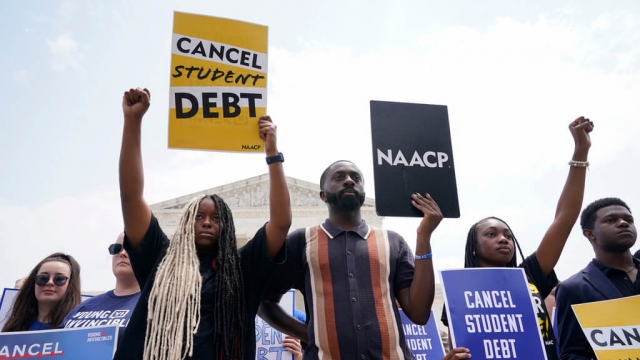Two decisions from the Supreme Court this week — affirmative action and student loan forgiveness — are affecting Black Americans particularly hard.
First, there was the decision driven by the court's six conservative justices overturning consideration of race in college admissions, effectively ending affirmative action in higher education. After getting rejected from Harvard, 21-year-old Calvin Yang fought back and helped end the long-held process of affirmative action.
"Today's decision has started a new chapter in the saga of the history of Asian-Americans in this country. It marks the promise of a new beginning, a resurgence of the principles of the American dream. And a return to the egalitarian principles for all in this shining city on a hill," said Yang, who joined Students for Fair Admissions to file the suit.
He went on to say, "affirmative action as a well-intentioned idea that is poorly executed in reality."
"No matter what this court says, we will continue to fight, no matter what this court says nothing can deprive us of what we call a race conscious future," said Damon Hewitt, the president of Lawyers' Committee for Civil Rights Under Law.
Justice Clarence Thomas wrote that the Constitution is colorblind, and neither knows nor tolerates classes among citizens.
"Deeming race irrelevant in law does not make it so in life," countered Justice Ketanji Brown Jackson.
Outside the Supreme Court, there was a student-led protest against the decision.
"I felt the weight of the decision, not only for myself, but for all of those who would come before me fighting for exactly what was struck down," said Nahla Owens, a junior at Harvard University.
Her tears turned to anger as she considered what her older family members had to endure.
SEE MORE: Biden slams GOP 'hypocrisy' as high court blocks student debt relief
"I think over the course of the day, it developed into sadness. I know that picture of me crying is circulating around. It turned into anger. And I think the thing that was really driving a lot of those emotions for me was thinking about my grandmother. She is an educator, has been an educator her entire life and actually her passion for education started when she was desegregating her own hometown school district and fighting for funding and the segregated black schools that she attended. So thinking that my grandmother, who I love dearly, was fighting the same battle for inclusion in academics and in education, and that I, generations later, would now have to continue that battle — it was a hard thing to grapple with. I felt like my generation was disappointing her, the judges had disappointed her and all the people who stood with her in that fight, and all the people who have come before me and organized for this very purpose. So I think that was just like I felt the weight of the decision, not only for myself, but for all of those who would come before me fighting for exactly what was struck down today," said Owens.
Those who support affirmative action say ending it will result in fewer Black college students, and ultimately fewer Black professionals in the workplace.
The University of Michigan has seen a 44% decline in Black enrollment since 2006, when the flagship school ended the use of race in admissions.
SEE MORE: Supreme Court rules against Biden in student loan relief case
"At the most selective institutions, diversity, racial diversity among the students declined. And even at places like the University of Michigan that engaged in substantial efforts to try and recruit and retain students with this, with at least the same profile of diversity as they'd had before, they have not been able to achieve the same diversity in the student body, " said Kristine Bowman, professor at the College of Education and College of Law at Michigan State University.
In another decision, the court effectively blocked President Biden's efforts to relieve student debt through a forgiveness program that would have wiped out as much as $400 billion in loans. During a rally in Washington, D.C. about the student loan decision, a heckler in the crowd yelled, "Pay your bills like adults!"
A Black man approached the microphone and responded,"That's good. We need to tell Wall Street to pay their bills."
The White House said Black college graduates on average have nearly $25,000 more in student loan debt compared to their White counterparts — an average of around $53,000 versus $28,000.
Black graduates pay off undergraduate debt at a slower rate as well. A disparity the White House says is partially due to wage gaps between Black and White workers.
"The courts have acted against our interest. But let me tell you this: Our fight is not over," said one man from the protest on student loan forgiveness.
Trending stories at Scrippsnews.com




